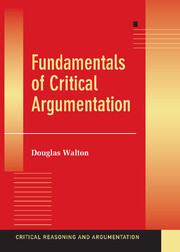FIVE - DIALOGUES
Published online by Cambridge University Press: 05 June 2012
Summary
Dialogues, as we saw in chapter 1, have characteristics such as civility, meaning that the two participants take turns making various moves. This chapter begins by analyzing the different types of dialogue that embody such characteristics in order to make the dialogue successful as an environment for using rational argumentation. Such moves include not only the putting forward of arguments, but also the asking of questions, including critical questions used to respond to arguments. It is the connected sequence of questions and answers, as well as chains of arguments, that make up the dialogues. Thus, asking the right questions in a dialogue and responding appropriately to the other party's questions are important aspects of what makes a dialogue move forward. This chapter classifies the different types of dialogue and examines some of the main properties of questions and how they are used in dialogues. Questioning is obviously very important in law and politics. For example, in a trial, a lawyer has to question a witness and sometimes in cross-examination can do so in quite a probing, even aggressive way. The lawyer for the other side often needs to object to such questions. Questioning is also very important in science at the discovery stage, where hypotheses are formulated.
Asking questions often seems like an innocent and harmless enough activity, you might think, from a viewpoint of critical argumentation.
- Type
- Chapter
- Information
- Fundamentals of Critical Argumentation , pp. 172 - 217Publisher: Cambridge University PressPrint publication year: 2005



